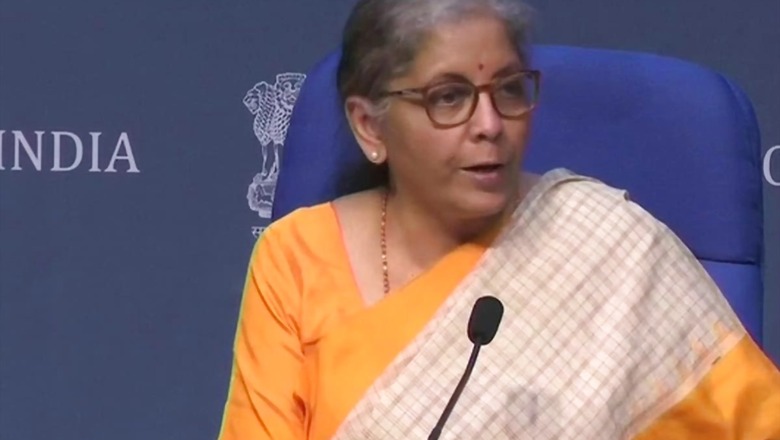
views
As Finance Minister Nirmala Sitharaman writes her Budget speech, she may consider reversing James Carville’s quote and say “It’s the politics, stupid!”
In doing so, she will acknowledge the people-centricity of her approach to the economy, moving beyond mere numbers and data. ‘Political’ implies a decisiveness unshackled from incrementalism; taking decisions that academics and the bureaucracy may tut-tut; and courageously digging deep into longstanding policy formulations, and reforming them.
Narendra Modi government’s response to the Covid-19 pandemic has been decisive and effective. The lockdown, the push to medical infrastructure, distribution of money and provisions for most needy, and now the development and roll-out of the vaccine have all underlined how exceptional a PM Narendra Modi is. The finance minister has provided able support—through the Atmanirbhar Bharat packages, swift action to provide relief to borrowers, and incentives for domestic manufacturing. Overall, the country has hopefully been saved from a potential health-economic disaster.
One would be naïve, however, to believe that we are out of the woods. The talk of a V-shaped recovery is premature. Covid-19 drastically exacerbated and complicated the pre-existing challenges to growth, making the finance minister’s task arduous. Demand remains subdued. The MSMEs (Micro, Small & Medium Enterprises), which were perhaps the hardest hit, are a distance from recovery. Some sectors, like tourism and hospitality, are significantly hobbled. Job creation to realise our demographic dividend remains a huge challenge.
ALSO READ| Budget 2021: Govt Should Set Stage for Unleashing Economic Growth for Decades to Come
What should, then, the finance minister speak about in her Budget speech? As the Prime Minister has said, she has already presented four-five mini-budgets. Beyond the numbers and allocations, one hopes that she will set the vision and tone for a three-year recovery and revival strategy. Assistance needs to be provided to sectors facing existential threat—to ensure no sudden sinkholes appear in the economy. Simultaneously, the finance minister has to chalk out the way to revive growth rates to the 8%+ aspirational level.
How will the policy ecosystem help in transformation of some industries, and the development of new, technology enabled sectors that produce champion global enterprises? Beyond the Budget numbers, we hope the finance minister sets the political tone for the economic policy.
Reviving Demand
The government spending has to be the catalyst for demand generation, at least till 2022. This needs actual, on-the-ground expenditure on projects. It is a positive sign that the Economic Survey has hinted at flexibility on the fiscal deficit. Finance Minister Sitharaman will need to provide granular details on how the additional resources will be spent. The National Infrastructure Pipeline offers a ready action list. Consideration will have to be given to linkage and follow-on demand generation, as well as the special needs of particular regions.
Beyond the obvious transport-logistics and medical, one hopes for investment in the knowledge economy—building tech infrastructure, creating digital commons—that can be accessed by people and businesses and also social support mechanisms, like child-care, support for the ageing members of the population etc.
Corporate Profitability
Private investment (which in turn drives demand, R&D spending) will happen only in an environment that nurtures businesses that can combine profits with good governance. Reduction in corporate taxes was a major move in that direction. Private sector participation in all but the most-sensitive sectors has opened up a host of greenfield opportunities. The finance minister has to set the tone for reducing red-tape and hurdles to business.
There remain too many ‘approvals’ that businesses need—while starting out and on an ongoing basis. She may consider providing guidelines to put in place strict timelines for approvals, regulatory prosecutions, resolution of tax disputes etc.
ALSO READ| Brooding on Budget: Despite Grim Scenario, Govt Should Continue Fiscal Prudence, Resist Higher Spending
Consistent Definition of Atmanirbhar Bharat
Prime Minister Narendra Modi’s Atmanirbhar Bharat programme may be his defining contribution to making India a global economic powerhouse. There remains, however, some inconsistency in its implications for policymaking. It will be very helpful if the finance minister can provide a consistent definition. It needs to be reiterated that India remains an open economy—in terms of trade, technology and capital. Atmanirbhar Bharat is designed to create businesses that use our vast domestic markets as a springboard to become globally competitive players.
Sustainable Employment
Sustainable, qualification-suited employment has to be a central theme. The Budget must build on the work done under Modi government 1.0. These are:
Skill development: The National Education Policy (NEP) has provided a futuristic foundation for education. Fit for purpose learning and skill building are critical. One hopes the finance minister in her speech would encourage a ‘shift’ from formal degrees to vocational education, apprenticeships. NITI Aayog will play a major role in anticipating future job requirements and reverse-engineering, to map the appropriate knowledge and skills’ sets that need to be provided to our youth.
Welfare ecosystem for the gig economy: Work from home and rapidly changing gig jobs need a supportive environment. In addition to connectivity and infrastructure, there is a need for redefining and making benefits more malleable. Outcome-based compensation instead of office attendance will be a theme. To encourage flexibility in taking on new roles, the finance minister may speak about an unemployment support system. The right ecosystem can dramatically improve productivity and increase workforce participation rates.
Self-employment beyond entrepreneurship: Just as FPOs (Farmer Producer Organisations) can potentially revolutionise returns on farming and help small farmers overcome scale issues, skilled workers too can be brought together, under smaller groups. Technology driven guilds can set quality standards and improve access to jobs.
ALSO READ| Covid-19 Has Shown Affordable, Accessible Healthcare Can’t Be Ignored. Budget 2021 Must Deliver on That
Fair-Playing Field and Income Inequality
Globally, people are rebelling against systemic inequality. It is also a fact that the pandemic has exacerbated income and wealth inequalities—at the individual and enterprise levels. Finance Minister Nirmala Sitharaman can perhaps discuss her glide-path to creating a well-thought-out welfare ecosystem that ensures that the most underprivileged also see improvement in their lives commensurate with the economic growth. An important element has to be access to opportunity. Similarly, she may address concerns about concentration of economic power. Entrepreneurship, MSME success et al will only achieve their potential if we provide a level-playing field with tight enforcement of competition protection mechanisms.
Nirmala Sitharaman, one hopes, will provide a political narrative for the Budget numbers—as a vision statement and to ensure broad citizen ‘buy-in’ to the economic agenda.
Read all the Latest News, Breaking News and Coronavirus News here

















Comments
0 comment